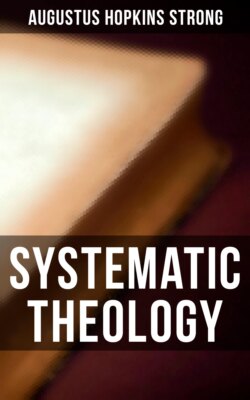Читать книгу Systematic Theology - Augustus Hopkins Strong - Страница 25
На сайте Литреса книга снята с продажи.
4. Scripture and Romanism.
ОглавлениеWhile the history of doctrine, as showing the progressive apprehension and unfolding by the church of the truth contained in nature and Scripture, is a subordinate source of theology, Protestantism recognizes the Bible as under Christ the primary and final authority.
Romanism, on the other hand, commits the two-fold error (a) Of making the church, and not the Scriptures, the immediate and sufficient source of religious knowledge; and (b) Of making the relation of the individual to Christ depend upon his relation to the church, instead of making his relation to the church depend upon, follow, and express his relation to Christ.
In Roman Catholicism there is a mystical element. The Scriptures are not the complete or final standard of belief and practice. God gives to the world from time to time, through popes and councils, new communications of truth. Cyprian: “He who has not the church for his mother, has not God for his Father.” Augustine: “I would not believe the Scripture, unless the authority of the church also influenced me.”Francis of Assisi and Ignatius Loyola both represented the truly obedient person as one dead, moving only as moved by his superior; the true Christian has no life of his own, but is the blind instrument of the church. John Henry Newman, Tracts, Theol. and Eccl., 287—“The Christian dogmas were in the church from the time of the apostles—they were ever in their substance what they are now.” But this is demonstrably untrue of the immaculate conception of the Virgin Mary; of the treasury of merits to be distributed in indulgences; of the infallibility of the pope (see Gore, Incarnation, 186). In place of the true doctrine, “Ubi Spiritus, ibi ecclesia,” Romanism substitutes her maxim, “Ubi ecclesia, ibi Spiritus.” Luther saw in this the principle of mysticism, when he said: “Papatus est merus enthusiasmus.” See Hodge, Syst. Theol., 1:61–69.
In reply to the Romanist argument that the church was before the Bible, and that the same body that gave the truth at the first can make additions to that truth, we say that the unwritten word was before the church and made the church possible. The word of God existed before it was written down, and by that word the first disciples as well as the latest were begotten (1 Pet. 1:23—“begotten again … through the word of God”). The grain of truth in Roman Catholic doctrine is expressed in 1 Tim. 3:15—“the church of the living God, the pillar and ground of the truth” = the church is God's appointed proclaimer of truth; cf. Phil. 2:16—“holding forth the word of life.” But the church can proclaim the truth, only as it is built upon the truth. So we may say that the American Republic is the pillar and ground of liberty in the world; but this is true only so far as the Republic is built upon the principle of liberty as its foundation. When the Romanist asks: “Where was your church before Luther?” the Protestant may reply: “Where yours is not now—in the word of God. Where was your face before it was washed? Where was the fine flour before the wheat went to the mill?” Lady Jane Grey, three days before her execution, February 12, 1554, said: “I ground my faith on God's word, and not upon the church; for, if the church be a good church, the faith of the church must be tried by God's word, and not God's word by the church, nor yet my faith.”
The Roman church would keep men in perpetual childhood—coming to her for truth instead of going directly to the Bible; “like the foolish mother who keeps her boy pining in the house lest he stub his toe, and would love best to have him remain a babe forever, that she might mother him still.” Martensen, Christian Dogmatics, 30—“Romanism is so busy in building up a system of guarantees, that she forgets the truth of Christ which she would guarantee.” George Herbert: “What wretchedness can give him any room, Whose house is foul while he adores his broom!” It is a semi-parasitic doctrine of safety without intelligence or spirituality. Romanism says: “Man for the machine!”Protestantism: “The machine for man!” Catholicism strangles, Protestantism restores, individuality. Yet the Romanist principle sometimes appears in so-called Protestant churches. The Catechism published by the League of the Holy Cross, in the Anglican Church, contains the following: “It is to the priest only that the child must acknowledge his sins, if he desires that God should forgive him. Do you know why? It is because God, when on earth, gave to his priests and to them alone the power of forgiving sins. Go to the priest, who is the doctor of your soul, and who cures you in the name of God.” But this contradicts John 10:7—where Christ says “I am the door”; and 1 Cor. 3:11—“other foundation can no man lay than that which is laid, which is Jesus Christ” = Salvation is attained by immediate access to Christ, and there is no door between the soul and him. See Dorner, Gesch. prot. Theol., 227; Schleiermacher, Glaubenslehre, 1:24; Robinson, in Mad. Av. Lectures, 387; Fisher, Nat. and Method of Revelation, 10; Watkins, Bampton Lect. for 1890:149; Drummond, Nat. Law in Spir. World, 327.
